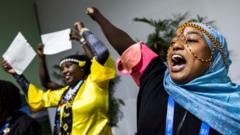A contentious atmosphere has enveloped the COP29 climate talks in Baku, Azerbaijan, as nations grapple with a draft deal that threatens to reverse the hard-won consensus on reducing fossil fuel reliance, established at last year's COP28 in Dubai. UK Energy Minister Ed Miliband voiced strong concerns, stating that stagnation on this issue would be viewed unfavorably by the global community. The United Kingdom, European Union, New Zealand, and Ireland collectively deemed the proposed agreement "unacceptable," signaling widespread dissatisfaction among developed countries.
Simultaneously, developing nations have voiced grievances regarding the lack of established financial aid to help them confront climate change challenges. These nations, alongside nearly 200 attendees at the conference, are caught in a predicament, balancing economic interests against the mounting pressures of climate commitments. UN Secretary General Antonio Guterres added to the urgency of the proceedings, insisting that "failure is not an option."
The tensions surround a fundamental trade-off: increased financial pledges from developed nations versus the demand for a concerted global reduction in fossil fuel use. As the draft deal brought forth challenges, oil-rich nations and some developing countries have expressed concerns that stringent fossil fuel commitments could impede their economic growth. EU Commissioner for Climate Action, Wopke Hoekstra, criticized the proposed agreement as "unbalanced," while U.S. Climate Envoy John Podesta lamented the absence of actionable commitments moving forward.
Representatives from vulnerable regions, like small island nations, have emphasized the critical need to uphold the advancements made at last year's summit. Calls for ambitious mitigation efforts echo throughout discussions, as Ireland’s Environment Minister Eamon Ryan highlighted that any lack of ambition would jeopardize further negotiations.
Compounding frustrations, many diplomats have pointed fingers at the Azerbaijan hosting of the conference for favoring the stance of the Arab group, which downplays previous fossil fuel agreements as merely optional. This interpretation has raised alarms about the sincerity of documented commitments made at the COP28.
The dissatisfaction is further magnified by developing nations accusing wealthier counterparts of backtracking on financial promises dating back to the Paris Agreement of 2015. The ongoing negotiations have seen no defined financial figures to facilitate the transition away from fossil fuels, provoking remarks from Bolivia's negotiator Diego Pacheco that the current situation is a "betrayal" of the global south's needs.
The G77+China alliance, representing various developing nations, continues to push for a significant pledge of $1.3 trillion by 2030, yet formal commitments remain elusive. Concerns remain over how this funding will manifest, with a strong demand for clarity regarding aid versus potential incurrence of loans that could exacerbate existing debts.
In a landscape where climate urgency clashes with economic concerns, COP29 faces an uphill battle in achieving a collective agreement that satisfies all parties and ensures adherence to previous climate commitments. The discussions continue, with high stakes for both the global north and south in navigating the complexities of climate finance and fossil fuel policy.




















